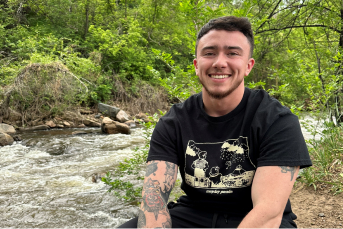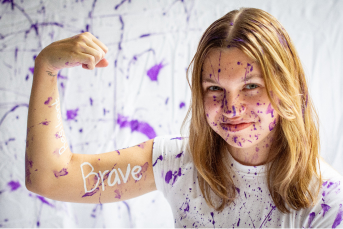Liana’s epilepsy story
When I was 15 years old I had my first gran mal (tonic-clonic seizure) in my Spanish class, I had been having increased absence seizures, with no knowledge of epilepsy or seizures other than what was portrayed in the media. I was having upwards of 60 seizures a day, I had an invasive EEG and a right temporal lobectomy, my seizure frequency was cut in half.
Looking at home videos, we found video evidence of absence seizures as a baby and toddler. My mom always said I was prone to very high fevers. So while my technical diagnosis is complex partial seizures, I believe I have had them since birth. I was born before the days of Google, so my parents had no idea.

What does epilepsy advocacy mean to you?
Epilepsy advocacy to me is simply being your truest self to figure out what works for you and your seizures. For me it's a mix of medications and surgeries, which have helped improve my seizures but have yet to control them. Hopefully, by adding lifestyle and diet changes I can find that control. I find it important because the ignorance around epilepsy and our community is surreal.
People I knew when I was younger now have children with the condition, and thankfully they are well controlled. I find it frustrating when people push what worked for them, epilepsy in a sense is an umbrella term. Two people with the same diagnosis can get vastly different treatments and each find control in themselves.I find it's important to advocate because someone could be born with epilepsy and have it controlled for a decent period of time and the seizures return even though that person is doing everything they've been doing to stay seizure free.
Perceptions of epilepsy
Body fluctuations change over time and can make you more or less susceptible to triggering a seizure without it ever having triggered you in the past. I stay connected in the community through FB groups, and social media. I also speak to other people who live with epilepsy - both controlled and uncontrolled. If a person reacts strangely to my seizures or feels some sort of way due to their ignorance and isn't willing to learn, my response is "well you don't deserve me in your life, if you can’t handle something that may or may not happen." I cannot control when or where I have a seizure yet 90% of the people around me can control their reaction to it, just be decent.
How do you use Epsy?
I downloaded Epsy in the beginning of 2020. I've used many different seizure tracker apps but my go to is Epsy, I love that Epsy allows you to note auras as well as seizures, I like that I can make notes and share them with my neurologist. I prefer it over other apps I have used in the past. It's so much more detailed, and I find it so helpful in relaying the info to the doctors. I believe this app would be helpful for others because it points out areas you aren't staying on top of like taking your medications on time.
Message to other people with epilepsy
Top tip be more stubborn than your epilepsy and you will win. My main message to those with epilepsy is that epilepsy is a life of trial and error, what works today may not work as well down the road. This doesn't mean you messed up, it means you have got to re-learn that control. Also avoid things that you know for a fact will send you into a seizure.
Share your story with us
At Epsy we love to share our users' stories within the community, if you would like to participate then contact our team at contact@epsyhealth.com.

















